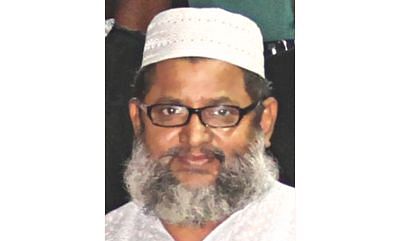<i>Nizami led Al-Badr to fight 'Indian agents'</i>

Prosecution witnesses yesterday started testifying in war crimes cases against Jamaat-e-Islami Ameer Motiur Rahman Nizami and Secretary General Ali Ahsan Mohammad Mojaheed in two international crimes tribunals. Misbahur Rahman Chowdhury, once a member of Jamaat's former student wing, gave deposition against Nizami at Tribunal-1, and war crimes researcher Shahriar Kabir testified against Mojaheed at Tribunal-2. Defence counsels began cross-examining Misbahur yesterday, while Tribunal-2 set August 30 for cross-examination of Shahriar Kabir.
Jamaat-e-Islami chief Motiur Rahman Nizami led the Al-Badr force during the Liberation War, said the first prosecution witness in the war crimes case against Nizami at International Crimes Tribunal-1 yesterday.
Through abolishing the Islami Chhatra Sangha, the then student wing of Jamaat, the Al-Badr, an auxiliary force of the Pakistan occupation army, was formed, said Bangladesh Islami Oikya Jote Chairman Misbahur Rahman Chowdhury.
Witness Misbahur, who was president of Moulvibazar's Pakistani Shahin Fouz, a wing of Islami Chhatra Sangha, was asked to join the Al-Badr.
Instead, he flew to London in August 1971.
The then president of Moulvibazar Islami Chhatra Sangha Sirajul Islam Motlib sent a letter to Misbahur's home asking him to join the Al-Badr.
Misbahur said, “the Islami Chhatra Sangha had taken a decision that within August 10, 1971, all its activists would have to join the Al-Badr.
All the activists were directed to collect appointment letters from Pakistani officer Maj Fakhrul Islam, who was in command in Moulvibazar.
“He [Sirajul Islam] also mentioned that if I joined the Al-Badr, Nizami Bhai [Motiur Rahman Nizami] would be personally happy and it was a duty for the soldiers of Allah to stand against the Indian agents,” the witness said.
“People who refused to join the Al-Badr would not be considered as activists of the Islami Chhatra Sangha,” he said.
He said he showed the letter to his father Abdur Rahman Chowdhury, who was involved in the Muslim League. His father got angry seeing it and sent him to London.
“It was also very dangerous stepping out of the Islami Chhatra Sangha at that time. That was another good reason for sending me to London,” he added.
Prosecutor of the case Mir Iqbal Hossain then showed Misbahur a photocopy of the letter. Misbahur confirmed the letter and signature on it as being of Sirajul Islam's.
Misbahur said he held a press conference regarding the activities of the Jamaat on February 16, 2008.
There he had shown the original letter but the original was later lost.
The Al-Badr, which was a regimental organisation, had superior power on other auxiliary forces--Razakar and Al-Shams. “The activists of Al-Badr were given arms training by the Pakistani army,” he said.
HEATED DEBATE
Defence counsel Tajul Islam was locked in a debate with the witness and later with the tribunal chairman over the witness' changing the word “power” with the words “more powerful than other auxiliary forces” in his deposition.
Tajul told Misbahur that he was testifying as if it was a political speech.
Misbahur reacted and said he was getting texts and calls on his mobile phone for not giving deposition.
Tribunal-1 Chairman Justice Nizamul Huq then asked Tajul to sit down but Tajul did not comply.
At one stage, Justice Nizamul described Tajul as “becoming disturbing” for the trial proceedings.
“You cannot tell me that I'm disturbing,” said Tajul.
The courtroom became calm again with the intervention of tribunal Judge AKM Zaheer Ahmed.
ON GHULAM AZAM
At one stage of his testimony, Misbahur said he had gone to meet Saudi King Faisal in 1974.
He met the Jamaat's former chief and war crimes accused Ghulam Azam to seek financial help from King Faisal.
“He [Ghulam Azam] told the king that freedom fighters had demolished most of the mosques and madrasas in the country. Religious education was about to end. There was no Quran found in the country for recitation. About 40,000 people who took part in the Islamic movement were killed,” Misbahur quoted Ghulam Azam as saying.
Ghulam Azam sought financial aid for the family members of the 40,000 people and reestablishment of mosques and madrasas.
Misbahur claimed that he had strongly protested Ghulam Azam's plea before the king.
He also apprised Moulana Abdur Rashid Tarkabagish, who was leading a team of the Bangladesh government, of the matter. He asked him to take necessary steps against Ghulam Azam.
ALLEGATION AGAINST RAZZAK
During his two-hour-long deposition, Misbahur alleged that Barrister Abdur Razzak, chief defence counsel for Jamaat leaders detained in connection with war crimes, was an Al-Badr man.
After the Liberation War, Abdur Razzak invited Misbahur to join an Islamic meeting in London.
At that meeting Misbahur learnt that Razzak had been an active member of Al-Badr and aided the Pakistani military until December, 1971.
After the liberation of Bangladesh, Razzak went to London through India, Nepal and Pakistan on a Pakistani passport, Misbahur said.
Terming the allegations false and deliberate, Razzak later in a statement claimed that not a single citizen of Bangladesh has ever made such allegations against him.
He also said the sole purpose of Misbahur's statement before the tribunal was to malign him as the chief defence counsel with the intention of preventing him from performing his professional duties.

 For all latest news, follow The Daily Star's Google News channel.
For all latest news, follow The Daily Star's Google News channel. 



Comments